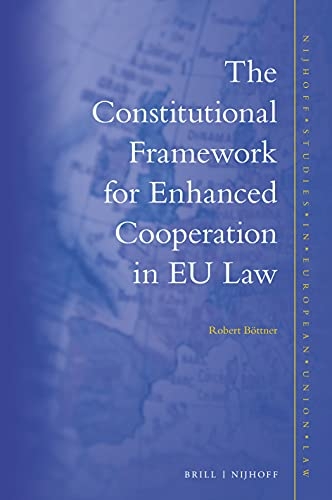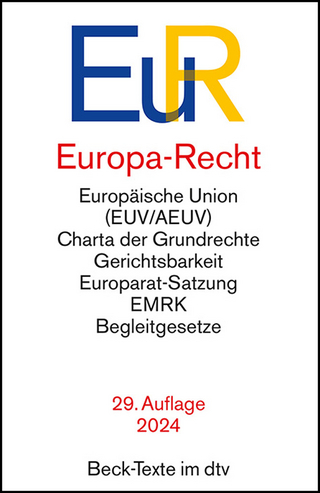
The Constitutional Framework for Enhanced Cooperation in EU Law
Martinus Nijhoff (Verlag)
978-90-04-45916-8 (ISBN)
Enhanced Cooperation allows a group of Member States to use the EU’s competences and institutions to pursue a project within the Union’s framework that is binding only on the participating States while remaining an EU act. Introduced by the Amsterdam Treaty, this tool of flexible integration was not used until 2010.
In The Constitutional Framework for Enhanced Cooperation in EU Law, Robert Böttner analyses the primary-law framework of this flexibility tool. On the basis of profound literature review and against the background of recent Member State practice, the author redefines the constitutional rules of Enhanced Cooperation. He draws conclusions on this tool’s legal limits, but also its potential for European integration.
Robert Böttner, B.A., LL.M., Dr. iur. (2020), German University of Administrative Sciences, is Assistant Professor at the University of Erfurt, Faculty for Law, Economics and Social Sciences. His research focuses on European economic and institutional law and national public law.
Acknowledgments
List of Figures and Tables
1 Introduction
2 Flexibility in the Logic of European Integration
2.1 Uniform Integration as a Starting Point
2.2 The Development of the Idea of Flexible Integration
2.3 The Development of Flexible Integration in ec/EU Practice
2.3.1 Primary-Law Based Flexibility Clauses
2.3.2 Schengen and the Area of Freedom, Security and Justice
2.3.3 Social Policy
2.3.4 Economic and Monetary Union
2.3.5 Common Foreign and Security Policy
2.3.6 The Instrument of Enhanced Cooperation as Enabling Clause
3 Practice of Enhanced Cooperation
3.1 Law Applicable to Divorce and Legal Separation (Rome III)
3.2 Unitary Patent Protection
3.3 Financial Transaction Tax
3.4 Property Regimes of International Couples
3.5 European Public Prosecutor’s Office (EPPO)
3.6 Permanent Structured Cooperation (PESCO)
4 The Authorisation Phase of Enhanced Cooperation
4.1 Cooperation between the Member States
4.2 Establishment within the Framework of the Union’s Non-Exclusive Competences
4.3 Minimum Number of Participating Member States
4.4 Furthering the Objectives of the Union, Protecting Its Interests and Reinforcing its Integration Process
4.4.1 Principles
4.4.2 Practical Cases
4.4.3 Conclusions
4.5 Enhanced Cooperation as a Last Resort
4.5.1 Principles
4.5.2 Practical Cases
4.5.3 Conclusions
4.6 Procedure for the Authorisation of Enhanced Cooperation
4.6.1 Request by the Member States Willing to Establish Enhanced Cooperation
4.6.2 Proposal by the European Commission
4.6.3 Parliamentary Participation
4.6.4 Council Decision
4.6.5 Conclusions
5 The Implementing Phase of Enhanced Cooperation
5.1 (Differentiated) Participation of the Union Institutions and Other Entities
5.1.1 Notion of “Union Institutions”
5.1.2 European Commission
5.1.3 Council of Ministers
5.1.4 European Parliament
5.1.5 European Council
5.1.6 National Parliaments
5.2 Procedure for the Adoption of Legal Acts
5.2.1 Procedural Aspects
5.2.2 Principles Governing the Adoption of Legal Acts
5.3 Bridging Clauses in Enhanced Cooperation
5.4 Financing Enhanced Cooperation
5.4.1 Bearing of Costs
5.4.2 Raising Revenue
5.5 Relationship to and Limits Imposed by General Union Law
5.5.1 Compliance with the Treaties and Union Law
5.5.2 No Undermining of the Internal Market or Economic, Social and Territorial Cohesion, No Barrier to or Discrimination in Trade, No Distortion of Competition
5.5.3 Conclusions
5.6 Relationship to the Non-Participating Member States
5.6.1 Principle of Openness of Participation
5.6.2 Non-Impairment between Participating and Non-Participating States
5.6.3 Conclusions
5.7 External Relations
5.7.1 External Union Competences
5.7.2 External Competences in Enhanced Cooperation
5.8 Establishment and Financing of Agencies
5.8.1 Establishment
5.8.2 Seat
5.8.3 Internal structure
5.8.4 Financing
5.8.5 External Dimension
6 Accession to, Withdrawal from, and Termination of an Established Cooperation
6.1 Accession
6.1.1 Entry Requirements and Conditions of Participation
6.1.2 Procedure
6.2 Withdrawal
6.2.1 Voluntary Withdrawal
6.2.2 Suspension and Expulsion
6.3 Termination
6.3.1 Termination by Revocation
6.3.2 Termination by Supersession
6.3.3 Termination by Participation of all EU Member States
7 Judicial Review in Enhanced Cooperation
7.1 Composition of the European Court of Justice
7.2 Judicial Review in the Authorisation Phase
7.2.1 Inaction by the Commission on the Member States’ Request
7.2.2 Negative Decision by the Commission on the Member States’ Request
7.2.3 Legal Action against the Authorising Decision
7.3 Judicial Review in the Implementation Phase
7.3.1 Actions against the Implementing Measures
7.3.2 Actions against Participating and Non-Participating Member States
7.3.3 References for Preliminary Ruling
7.4 Judicial Review Regarding Membership in an Established Cooperation
7.4.1 Accession of a Non-Participating Member State
7.4.2 Sanctioning a Participating Member State
8 Other Forms of Closer Cooperation in Union Law
8.1 Special Forms of Enhanced Cooperation
8.2 Closer Cooperation in the Area of Freedom, Security and Justice
8.2.1 Schengen
8.2.2 Accelerated Enhanced Cooperation
8.3 Closer Cooperation in the Economic and Monetary Union
8.3.1 Primary-Law Based Closer Cooperation
8.3.2 Enhanced Cooperation in the Euro Area
8.4 Common Foreign and Security Policy
8.4.1 Nature and Scope of the Common Foreign and Security Policy
8.4.2 Enhanced Cooperation in Common Foreign and Security Policy
8.4.3 Flexibility Instruments in Foreign and Security Policy
8.5 Conclusions
9 Conclusions and Prospects
9.1 Conclusions from the Practice of Enhanced Cooperation
9.1.1 Summary of the Main Findings Regarding the Constitutional Rules on Enhanced Cooperation
9.1.2 Enhanced Cooperation as an Instrument of Flexible Integration
9.2 Future Areas of Enhanced Cooperation
9.2.1 Internal Market
9.2.2 Area of Freedom, Security and Justice
9.2.3 Tax Policy
9.2.4 Social Policy and Citizenship Rights
9.2.5 Environment and Energy
9.2.6 Regional Cooperations
9.2.7 Concluding Remarks
Annex: Membership in Cases of Enhanced Cooperation
Bibliography
Index
| Erscheinungsdatum | 24.02.2021 |
|---|---|
| Reihe/Serie | Nijhoff Studies in European Union Law ; 17 |
| Sprache | englisch |
| Maße | 155 x 235 mm |
| Gewicht | 808 g |
| Themenwelt | Recht / Steuern ► EU / Internationales Recht |
| Recht / Steuern ► Öffentliches Recht | |
| Recht / Steuern ► Privatrecht / Bürgerliches Recht | |
| ISBN-10 | 90-04-45916-2 / 9004459162 |
| ISBN-13 | 978-90-04-45916-8 / 9789004459168 |
| Zustand | Neuware |
| Haben Sie eine Frage zum Produkt? |
aus dem Bereich


